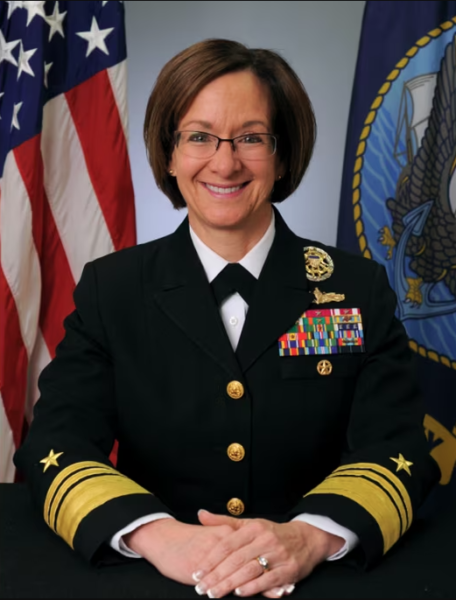I don’t follow US military appointments closely because I’m not in the military, nor an American, so the first time I think I heard of Admiral Franchetti was back in May where Brent Ramsey’s report touted her as the one to watch for the upcoming appointment as the Chief of Naval Operations (she became VCNO in September 2022). Now, CDR Salamander confirms that Admiral Franchetti is almost certainly now the “CNO in waiting”:
I am sure that everyone here understands that at the end of last week white smoke rose over The Navy Yard signaling that we had an official nominee for the next Chief of Naval Operations (CNO).
Barring some Ottomanesque bureaucratic defenestration like we saw as Admiral Moran was set to be CNO after Admiral Richardson, the nominee to replace Admiral Gilday as CNO will be Admiral Franchetti — presently the Vice CNO.
Because people in DC can’t seem to keep their mouths shut when they should, unfortunately in mid-month there were some leaks coming out that Admiral Paparo would — surprisingly as the general consensus was the Franchetti was slotted to be the next CNO — be recommended to be the next CNO.
Read the link above it you’re interested in the state of play on the 13th, but things wound up heading as most thought with Franchetti getting the nod. Exceptionally well prepared for INDOPACOM, Paparo will head to there where he is expected to continue to do great and important things for the Navy and the nation it serves at at time where we have no luxury for a learning curve.
Despite Ramsey’s article not-so-subtly raising doubts about Admiral Franchetti’s qualifications for the post, CDR Salamander seems to be signally unruffled with the news:
Her wiki page has a nice concise summary;
Since promotion to flag rank, Franchetti has held appointments as: commander, United States Naval Forces Korea; commander Carrier Strike Group 9; commander, Carrier Strike Group 15; and chief of staff, Joint Staff, J-5, Strategy, Plans and Policy; and Commander, United States Sixth Fleet, Naval Striking and Support Forces NATO; deputy commander, United States Naval Forces Europe; deputy commander United States Naval Forces Africa; and Joint Force Maritime Component Commander.
- Western Pacific: she knows Korea and all associated areas. She also has Pappy coming in to INDOPACOM — an exceptional partner. I hope they have a solid professional relationship already.
- Fleet Challenges: from maintenance to readiness, her time leading CSG-9 and CSG-15 gave her a first person look at it. She knows it.
- JS J5: that speaks for itself.
- C6F et al: she knows Europe and has already built a working and personal relationship with many of her peers in NATO. She’s seen up close what they do and how they do it. Invaluable.
- VCNO: the most important. She’s seen OPNAV and the Potomac Flotilla up close. The greatest danger to her tenure as CNO — and as such our Navy and the nation it serves — is not spotty relationships with the SECNAV and his staff; it not Congress; is not the press; is not the economy; and it sure isn’t her Sailors writ large — no — the greatest threat is the long-dwell nomenklatura in a commuting distance of The Pentagon and The Hill who do not see their job as adjusting their responsibilities to support the CNO, but to bend the CNO towards their personal agendas, projects, and job security. There are some exceptional and valuable people there to support the CNO, but the organization is worm-ridden with rent seekers and bad actors. She’s seen that up close. She knows it.
Since making Flag, she managed to walk around all the rakes, had good luck and timing (part of any success), and she did a solid job as assigned. She has the right experience and performance.
I know a handful of people, some friends of mine for over two decades, who know her personally and have since they were both JOs. With one mild exception, these people I would trust my family with speak well of her. That combined with what I’ve seen in open source works for me.






